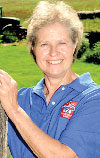Rain poured down continuously from leaden skies overhead. Inside the calf nursery, the newest babies were settling down to rest after guzzling down their breakfast bottles. The bawling of older ones, impatient for their shares of morning milk and fresh feed, partially drowned out the staccato hammering of raindrops pounding the barn’s metal roof. Sheltered from the deluge only by a red, plastic rain poncho, I swooped from the nursery like a crimson Batman, swiftly slipping warm bottles of milk into holders on the pens of the outside calf condos. A yard-wide stream flowed past the nursery door, requiring a leap over the runoff to feed a final round of morning hay to the weaned calves in the barn on the opposite side.
Up on the road, a tractor and feed wagon glided by, ghostly machine shadows moving through the thick curtain of downpour. Although temporarily dry in the tractor’s cab, our herdsman would be dripping wet before he finished mixing and delivering feed for cows and heifers, climbing in and out of the sheltered cab to scoop silages, add minerals and move gates.
A job in a snug office certainly offers some appeal on such a nasty morning. But that’s not why we signed on to be dairymen. Rain or shine, blizzard or baking heat, dairy farmers do what we do for a love of farming and a dedication to the “girls” that are the foundation of who we are and what we are about.
Sure, dairy farming is about economics. It’s a business. It has to be. Like dairy farm owners worldwide, we have a personal and financial stake in our milking herd and young replacements, as well as the crops and equipment needed to grow and keep them healthy and well-fed.
But it’s not just sheer economics that drives dairymen to dash between hurricane downpours, battle potential blizzard frostbite or endanger their lives moving animals threatened by an approaching, wind-driven wildfire. It’s a genuine caring and compassion about the animals that are part of the dairy farm team.
It’s the caring about a first-calf heifer in labor that sends hubby out of his comfy easy chair long after dark to check her progress, deliver the calf, see that she’s tending it, offer the heifer water and hay and then, finally, snatch a few hours’ sleep long after his usual bedtime hour.
It’s caring about a heifer that slipped through a tree-downed fence trying to find her way back in. And, in the process of checking all the corners of the rain-soaked meadow at dusk for other signs of broken fence, burying not only the old farm Jeep up to its hubs in mud, but the four-wheeler as well.
It’s caring about a prematurely-born heifer calf – wet, cold and shivering in late December – that causes him to tenderly wrap it in an old blanket, lay it close to the basement wood stove and let me be surprised when I find the new (temporary) household pet.
Activists with agendas and clandestinely obtained videos eagerly twist the truth about how livestock producers care for their animals, waving before the media a few, rare instances where abuse has been documented. Dairy farmers, as well, condemn abusive behavior found within their own ranks. Our industry, individually and collectively, cannot and will not tolerate animal abuse.
The consuming public has generally viewed farmers as credible and honest. And non-farmers can readily identify with animal-care messages that relate to the care they give their own families: special attention to newborns and new moms, routine herd health care and vaccinations, pregnancy checks, professional foot care and balanced nutrition in diets.
From large, complex operations to small, simply-designed ones, the end goal of dairying is still the same – to maximize the value of the cow and the calf by providing quality care and comfort, and to do so with compassion and common sense.
Dairymen are the most experienced, the most knowledgeable, the most credible and genuine source of the dairy farm story, because we live it every day. We need to share the stories of our livelihoods, whenever, wherever and however opportunity provides, providing truth and facts to prevail over misinformation, misrepresentation and misguided guerilla tactics by activists with agendas.
We owe it to our industry. We owe it to each other. We owe it to our future. PD
Joyce Bupp and her husband milk 200 cows and farm 750 acres in southeastern Pennsylvania. She is a member of Dairy Farmers of America, Inc.’s Board of Directors and serves as president of the DFA Cares Foundation, among numerous other industry leadership positions.






